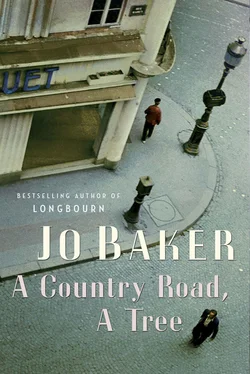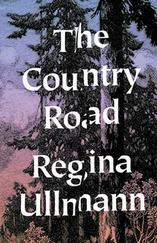“Hey! Hello there! Hey! Hold on!”
He flinches, but stumbles on, one foot in front of the other, in the shoes his mother bought him. Bloody Dublin; just a big village. There’s always somebody who knows you. Whoever it is, they’ll give up, with any luck. But no luck: a hand lands on his arm. He stops, looks down at it. A small, smooth gentleman’s hand. He looks up.
“There, see. I knew it was you.”
A light-boned, boyish fellow grins at him. It has been a while, but he is instantly familiar. He swallows down the bloody wet.
“Alan.”
His voice is slushy, indistinct; he lifts the handkerchief to his ragged lips. Dr. Alan Thompson, who has been busy making his mother proud. Still boyish and light on his feet, and a decent chap, and a medical man; so he won’t faint or run shrieking at the sight of him.
Hands are shaken.
“Good to see you,” he manages.
“Good to see you too.” Alan frowns, though, peers in. “What’s up? You’re in a bit of a state.”
“Dentist,” he says.
“Butcher, more like. Extractions?”
He nods. “And fillings.” When he speaks, his whole skull aches.
“Come by the office. It’s probably not just your teeth needing attention.” Alan takes his arm. “In the meantime, I can see you require a calmative and a restorative, and those gums could do with an additional disinfectant.”
He can’t face any further procedures, not today. And anyway, he can’t afford it. He demurs.
Alan smiles. “No, no, I insist. What you need, my friend, is whiskey, and a good deal of it. That’s my professional opinion. I’m buying.”
It is the best thing he has heard in days. Alan steers him round, and off and into the Bleeding Horse.
—
It is all settled within the hour, within half a bottle of Jameson’s.
The smoke spools up to the ceiling and the drinkers press elbow to elbow at the bar. The first sip of whiskey sears, the second stings, the third he cups warm on his tongue and waits and looks to Alan, and his eyes crease at the company. He swallows, lifts his glass again and looks at the piss-gold stuff.
“I feel so much better. I don’t know why I didn’t think of it myself,” he says.
“Well, you’re not yourself right now, you know.”
They have the gist of each other’s recent lives. On closer inspection, time has had some small effect on Alan. He’s not quite the boy he used to be. His hair is receding a little, and there are lines at the corners of his eyes and from nostril down to lip. But overall, the years have handled the boy gently, compared with how they’ve battered him. He feels ancient; he feels shambolic. A broken-down old tramp. A mummy.
“Are you still at the writing?” Alan asks.
“I would be, but I can’t. Not here. Not at Mother’s. Never could.”
“You must be keen as mustard, then, to get back to France.”
“I have friends there. I’m worried.” He nods over his glass. “But only essential workers can travel, so—” A lifted shoulder. He is stuck.
“Lookit,” Alan says, leaning in closer. “Here’s something might interest you.”
He leans in too, already bleary, struggling to focus through the aftermath of gas and pain and shock and the current blur of whiskey.
“There’s this Red Cross venture I’m involved in,” Alan says. “We’re taking a hospital to France.”
“A what?”
“A hospital. It’s going to a little place called Saint-Lô; the town got flattened during the liberation. So we’re taking them a hospital. We’re getting our supplies together now and will make the crossing in August.”
“With a hospital?”
He sips, nods. “We have to take everything with us. Everything from syringes to marmalade to lino. There’s nothing there at all. We have to get hold of what we need here, sort it, store it, ship it off to France. And then get it all set up when we’re over there.”
“That is quite an undertaking.”
“Indeed it is. And we aren’t yet fully staffed. And so I thought. See, we’re looking for a quartermaster. Someone to take care of the logistics this end and then sort it out over there in Normandy.”
“I see.”
“And so, I was thinking, why not you? Because with your language skills, you could be our interpreter too. Some of us have schoolboy French, but…”
It doesn’t sound like the kind of thing that he could do. But then nothing ever does.
He raises his glass and sips. And then he nods.
“Good,” Alan says. “So then we’re agreed. And you’ll take another drink.”
—
He is overseeing the unloading of refrigerators in the Red Cross warehouse when Mrs. Hackett comes in with the evening edition and waves it in front of him. He reads the headline without understanding it. He stares at her.
“That hallion is dead,” she says. “Took his own life, can you imagine? That’s it.”
And so the war is over. He wipes his hands down his dungarees. He thinks, I am wearing dungarees, Hitler is dead, and the war is over.
It is a blossom-heavy bloody day in May, and it’s impossible to feel anything simple.
He does not go back to his mother’s house in Foxrock, but instead walks along the banks of the Liffey and up into the congested heart of town. There are aimless angry crowds on College Green, and a Union Jack smouldering on the gates. He keeps on walking. He ends up in a bar that he doesn’t normally go to, in the hope of seeing nobody he knows, but this being Dublin he just stares at his drink to make doubly sure. He downs whiskey after whiskey after whiskey, while all around him Dublin scratches and yelps and shivers at its old sores.
—
When it happens, there is nothing grand about it, nothing sublime. There’s no gale, no tossing waves, no spray in the air; it is not a storm-torn sky above him but the low ceiling of his mother’s bungalow. There’s no pathetic fallacy here. It might be the moment when everything changes for him, but that doesn’t oblige the world to notice, or do anything particular to mark the occasion.
It’s early evening. The electric fire is eating all the air. A dinner of pap uneasy in his belly, his mouth still raw, the radio on, he is writing to Suzanne as his mother studies a seed catalogue in the armchair and turns rustling pages. His tongue explores craters, jellied blood. He tells Suzanne about the Red Cross work, a salary, some hope of paying back Valéry Larbaud, his hope too that he will be returned soon to France, though not yet to Paris; he will come and see her as soon as he gets leave. Suzanne is a vein of guilt running through all the other manifold discomforts. His thoughts slip into that former life: his old apartment, and the cool solitude through which Suzanne would twine like a cat; her naked belly under his hand; a brilliant smile; eyes closed at the Opéra, there and gone, and gone sometimes for days. He doesn’t see that it can ever return to that. Something or other will have to be done. Because, by rights, Suzanne should be here, getting fattened up on butter, milk and cake; she would be, if they were married. It would be a coin into the kitty if they were.
His mother glances up from the lists of bulbs and corms and tubers; in the spring, they will brighten this new bleak wilderness of hers. She regards her boy. There is grey in his hair. There are lines around his eyes. She can see the old man that he will become and her heart aches for him. No comfortable desk in the family firm, no children on his knee, nothing so simply good, not for him. His weak eyes straining always on impossibilities.
She watches as he finishes his letter; he blows on it, then folds it up. There is a line between his eyebrows as he looks towards her. Perhaps he’s noticed the palsy in her hands, the way it makes the paper shake. She sets the catalogue aside, meshes her fingers and presses her bundled hands down into her lap to stop them trembling. She will not let him see that she is ill.
Читать дальше










